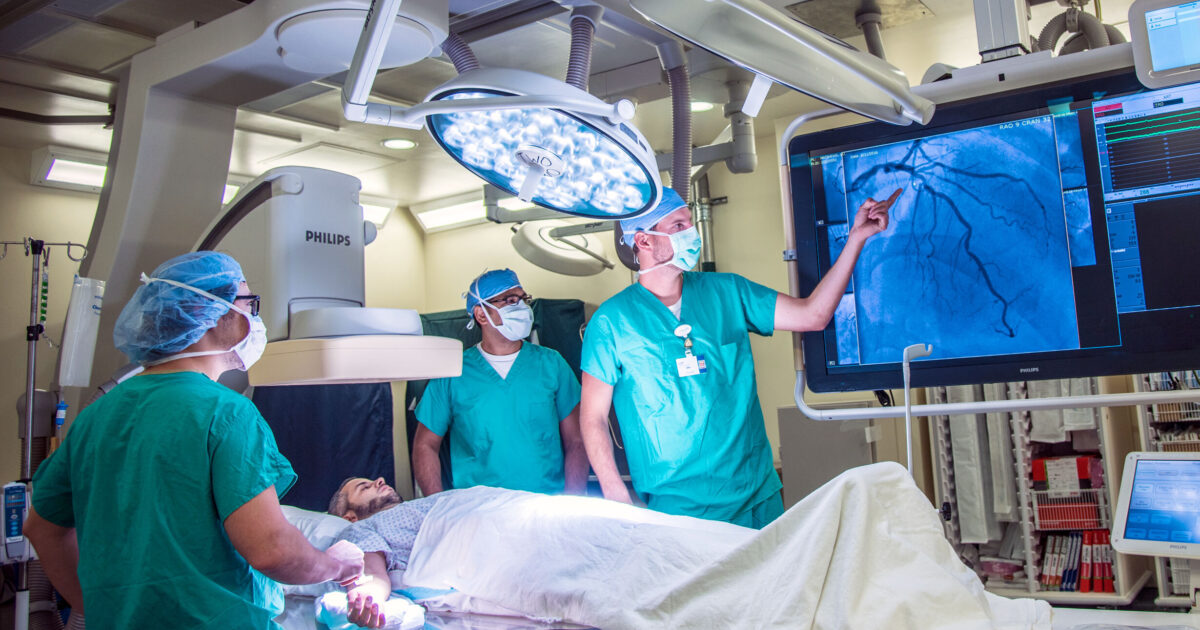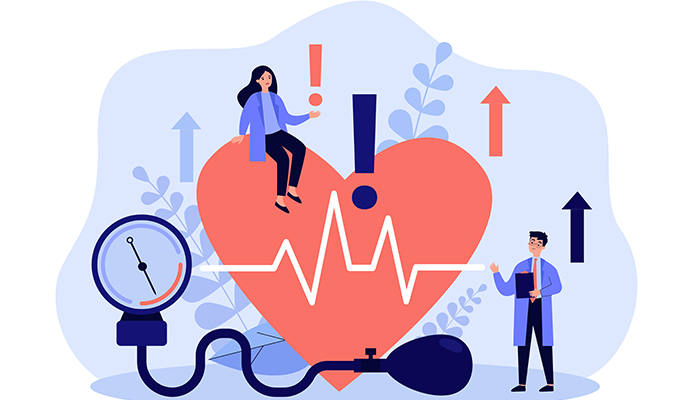Healthy diets through the lens of Cardiology care
Healthy diets through the lens of Cardiology care
Blog Article
Recognizing the Value of Cardiology in Modern Health Care Providers
Cardiology plays a vital role in modern-day health care, especially as cardiovascular disease proceeds to be the leading root cause of death worldwide. Breakthroughs in diagnostics and therapy have changed patient care, allowing earlier treatments and boosted outcomes. Additionally, the shift in the direction of preventative cardiology encourages people to handle their health proactively. As modern technology remains to progress, the combination of innovative solutions might additionally redefine cardiology's influence on public health, motivating a more detailed evaluation of emerging fads and their ramifications.
The Prevalence of Heart Disease and Its Effect On Public Health And Wellness
Although heart disease continues to be the leading reason of death around the world, its effect extends much beyond specific clients to affect public wellness systems and economic climates. The high occurrence of cardiovascular disease puts a substantial stress on medical care resources, demanding enhanced funding for avoidance, rehabilitation, and treatment programs. Public health efforts have to deal with threat factors such as weight problems, smoking, and inactive way of livings, which contribute significantly to the climbing occurrence of heart conditions.Moreover, the economic concern connected with heart problem is immense, including not just straight medical expenses but likewise indirect costs connected to shed productivity and premature mortality. Neighborhoods encounter obstacles in managing these costs, typically causing differences in medical care access and outcomes. As the population ages and lifestyle-related risks continue to intensify, the seriousness for efficient cardiology interventions ends up being vital. Subsequently, resolving cardiovascular disease is not just an issue of specific wellness yet additionally an essential public wellness top priority.
Developments in Heart Diagnostics and Imaging Techniques
Recent developments in cardiac diagnostics and imaging strategies have actually reinvented the field of cardiology, enhancing the capacity to keep an eye on and discover heart problem. Techniques such as heart MRI, CT angiography, and echocardiography have become significantly innovative, offering detailed photos of cardiac structures and features. These techniques allow for the very early identification of problems like coronary artery illness, heart failure, and valvular disorders.Moreover, developments in non-invasive diagnostics, such as wearable technology and remote surveillance gadgets, have actually equipped patients and health care suppliers. These tools promote real-time tracking of heart rhythms and various other vital signs, causing timely treatments. Additionally, man-made intelligence is being incorporated right into imaging evaluation, improving accuracy and efficiency in diagnosis.
Advancements in Treatment Options for Heart Conditions
Recent improvements in cardiology have actually led to substantial innovations in therapy options for heart problems. These include advanced surgical strategies that enhance procedural results and arising medicines that use new opportunities for treatment. As the area evolves, these advancements play a vital role in enhancing person care and results.
Advanced Surgical Techniques
Advancements in medical techniques have transformed the landscape of cardiology, using brand-new wish for patients with heart conditions. Minimally invasive treatments, such as catheter-based interventions, have considerably lowered recuperation times and healthcare facility stays. Methods like robotic-assisted surgical treatment boost accuracy, permitting doctors to navigate intricate physiological frameworks with better accuracy. Improvements in imaging modern technology promote real-time visualization throughout procedures, enhancing results. Transcatheter aortic valve substitute (TAVR) exhibits a breakthrough in treating aortic constriction, enabling shutoff replacement without open-heart surgery. Additionally, hybrid approaches that combine catheter-based and surgical approaches supply tailored services for various heart concerns. These sophisticated surgical strategies not just improve client safety yet likewise expand therapy choices, underscoring the crucial duty of advancement in contemporary cardiology practices.
Arising Treatments and medications
As the landscape of cardiology proceeds to progress, emerging drugs and therapies play a pivotal function in enhancing therapy options for heart problems. Advancements such as novel anticoagulants and progressed lipid-lowering agents have actually transformed the administration of cardiovascular illness, greatly lowering client morbidity and death. Furthermore, the growth of gene treatments and regenerative medicine provides encouraging opportunities for dealing with conditions previously regarded irreversible. Professional trials are constantly disclosing the efficacy of these treatments, pressing the boundaries of standard therapies. Furthermore, the assimilation of electronic health innovations promotes customized medication, enabling tailored treatment plans based upon hereditary and lifestyle elements. Jointly, these advancements underscore the dynamic nature of cardiology, improving client results and redefining requirements of treatment in modern-day medical care.
The Duty of Preventive Cardiology in Patient Care
Preventive cardiology plays an important function in client care by focusing on the identification of risk elements that add to heart problem. Through lifestyle modification strategies and early discovery strategies, medical care carriers can properly lower the occurrence of cardio events - Cardiology. This positive method not just improves person end results yet additionally advertises long-lasting health
Threat Variable Recognition
While cardiovascular diseases continue to be a leading reason of morbidity and mortality worldwide, effective threat aspect identification acts as a keystone of precautionary cardiology. Identifying threat aspects such as hypertension, diabetes mellitus, hyperlipidemia, and household background is vital for very early intervention. Healthcare experts utilize different screening techniques to evaluate these aspects, allowing for customized safety nets. Furthermore, understanding an individual's lifestyle options, such as smoking and physical inactivity, better notifies threat assessments. This complete evaluation makes it possible for medical professionals to develop individualized treatment plans targeted at mitigating threats. By focusing on risk aspect recognition, healthcare systems can improve person outcomes and decrease the general worry of heart diseases, eventually adding to improved public health methods and source appropriation.
Lifestyle Adjustment Methods
A plethora of studies highlights the crucial function of way of life alteration approaches in reducing cardiovascular disease risk. These techniques include dietary modifications, boosted exercise, smoking cigarettes cessation, and weight monitoring. By taking on a heart-healthy diet regimen abundant in fruits, veggies, entire grains, and lean healthy proteins, individuals can reduce cholesterol levels and blood pressure. Regular exercise strengthens the heart and improves overall cardio wellness. In addition, giving up smoking cigarettes substantially minimizes the danger of heart illness and improves recovery rates for those with status quo. Weight administration additionally contributes to cardiovascular health by reducing other danger variables such as diabetes and hypertension. Implementing these way of living transforms not only promotes specific well-being however additionally works as a foundation of preventative cardiology in person treatment.
Very Early Discovery Strategies
Way of living alterations greatly add to decreasing heart disease threats, however they are most reliable when coupled with early detection techniques. Preventive cardiology emphasizes the value of recognizing potential heart issues prior to they rise into severe conditions. Strategies such as blood pressure monitoring, cholesterol testing, and progressed imaging technologies like echocardiograms play essential functions in examining cardiovascular wellness. Biomarkers and genetic testing likewise boost the precision of early detection, permitting tailored precautionary techniques. Routine cardiac threat examinations encourage medical care providers to interfere proactively, possibly stopping cardiovascular disease and strokes (Cardiology care). By incorporating these early discovery methods into regular treatment, people can gain from timely way of life interventions and targeted therapies, inevitably enhancing and improving outcomes quality of life
Integrating Modern Technology Into Cardiology Practices
As improvements in innovation proceed to reshape different areas, the assimilation of innovative tools and systems into cardiology practices has ended up being necessary for improving this article person treatment and outcomes. Telemedicine systems permit cardiologists to keep an eye on individuals remotely, boosting access to care while lowering the concern on medical care facilities. Wearable devices, such as smartwatches, make it possible for constant heart rate surveillance, notifying both physicians and patients to potential issues in real-time. Additionally, artificial intelligence (AI) is being made use of to evaluate substantial amounts of cardiac information, helping in early diagnosis and personalized treatment plans. Advanced imaging strategies, consisting of 3D echocardiography, improve visualization of heart structures, resulting in more precise treatments. Digital health and wellness records (EHRs) improve client information management, making certain that cardiologists have instant accessibility to vital data. Together, these technical improvements are transforming cardiology, advertising positive management and boosted health results for patients with cardio conditions.
The Significance of Client Education And Learning and Interaction
Person education and interaction play a pivotal function in the monitoring of cardiovascular health and wellness. By gearing up patients with understanding concerning their problems, treatment choices, and way of living adjustments, doctor encourage individuals to take an active function in their treatment. my response This proactive method can cause boosted adherence to prescribed medicines, dietary changes, and workout routines, inevitably decreasing the risk of complications.Engagement likewise promotes a solid patient-provider relationship, encouraging open communication and depend on. When people really feel informed and involved, they are more probable to voice worries and ask inquiries, which can bring about far better clinical outcomes. Additionally, educational resources, such as workshops or electronic platforms, can enhance understanding and promote self-management strategies. Overall, prioritizing patient education and engagement is important for enhancing cardiovascular health, improving quality of life, and reducing medical care expenses connected with heart diseases.
Future Patterns in Cardiology and Their Prospective Effect

Often Asked Questions
What Lifestyle Changes Can Reduce Cardiovascular Disease Danger?
The current inquiry addresses way of living modifications that can greatly lower cardiovascular disease threat. Dr Garcia. Taking on a balanced diet regimen, participating in regular physical task, preserving a healthy and balanced weight, handling tension, and staying clear of cigarette can significantly improve cardio health
Just How Can I Recognize Very Early Signs of Heart Troubles?
Recognizing early indications of heart issues involves tracking signs and symptoms such as chest pain, lack of breath, tiredness, and uneven heart beat. Timely awareness of these signs can motivate necessary medical analysis and intervention for better results.
What Are the Distinctions In Between Cardiologists and Cardiac Surgeons?
The differences in between cardiologists and cardiac specialists depend on their roles; cardiologists mostly detect and manage heart conditions with non-invasive methods, while cardiac doctors perform surgeries to remedy check out this site architectural heart issues. Each plays an important, distinctive duty.

How Often Should I Obtain My Heart Health And Wellness Checked?
The frequency of heart medical examination differs based on specific danger variables. Usually, adults should undertake examinations every one to 2 years, while those with existing problems may call for even more frequent evaluations as encouraged by healthcare specialists.
What Function Does Genes Play in Heart Illness Risk?
Genes greatly affects heart problem danger, with familial patterns suggesting inherited conditions. Details genes can incline individuals to high blood pressure, cholesterol issues, and other cardio problems, highlighting the relevance of genetic testing in evaluating heart health and wellness. Heart condition remains the leading reason of fatality worldwide, its influence extends far past individual clients to influence public health systems and economic climates. Public wellness initiatives should resolve risk elements such as excessive weight, smoking, and inactive way of lives, which add greatly to the increasing occurrence of heart conditions.Moreover, the financial worry associated with heart illness is enormous, incorporating not just straight medical costs however likewise indirect expenditures connected to shed productivity and premature mortality. Preventive cardiology plays a necessary duty in person treatment by focusing on the identification of risk factors that contribute to heart disease. Synthetic intelligence (AI) and maker discovering are improving diagnostics and person surveillance, making it possible for very early discovery of heart conditions. The distinctions in between cardiologists and cardiac specialists lie in their functions; cardiologists mainly manage and diagnose heart problems via non-invasive approaches, while heart specialists do surgical procedures to correct architectural heart concerns.
Report this page